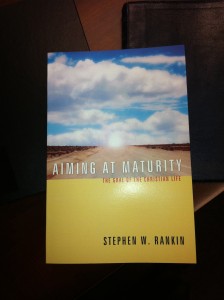 I recently published a book on spiritual maturity and I’m going try to develop the habit of blogging regularly about themes related to the book. This post is one and it touches on a very personal struggle.
I recently published a book on spiritual maturity and I’m going try to develop the habit of blogging regularly about themes related to the book. This post is one and it touches on a very personal struggle.
I continue to think about the challenges of Christian disciples growing to maturity – to the full measure of the stature of Christ – as Ephesians 4 puts it. I find myself thinking about this goal from several angles.
First, all Christians bear witness to the goodness of the Good News by virtue of the character we demonstrate in our relationships to others, in our words and actions. A big challenge here.
Second, Christian leaders need to pay particular attention to the goal of the full stature of Christ in order to lead effectively. Leaders lead with their lives. (Even leadership gurus recognize and write about the power of personal modeling.)
Third, closer to home for me, I need to grow up.
This morning I was reading John Wesley’s second discourse on the Sermon on the Mount. There, he expounds on Jesus’ teaching, “Blessed are the meek, for they shall inherit the earth.” What does it mean to demonstrate meekness? Wesley explores this question in the early part of the sermon, which is where I found this little nugget:
[The meek] do not desire to extinguish any of the passions which God has for wise ends implanted in their nature. But they have the mastery of all; they hold [the passions] in subjection, and employ them only in subservience to those ends. And thus even the harsher and more unpleasing passions are applicable to the noblest purposes.
Passions, in Wesley’s time, were understood generally to cause problems. We use the word today in a much more positive light. We think of passion as intensity, enthusiasm, and commitment, as in “I have a passion for…” Not so much in Wesley’s day. “Passions” generally got people in trouble, afflicting them and pushing them toward unwanted behaviors.
Keeping with this 18th century understanding, for a moment, we might think that God needs to deliver us from such passions in order to grow toward maturity. In other words, growth is evidenced by the removal of such problematic feelings from our “character repertoire.” After all, the passion is what causes problems for Christians. But here Wesley shows not that we are “delivered from,” but that the passions are trained toward God’s purposes.
Thus, he mentions a passion like anger. I’m glad he does because I struggle here. I’m too intense, too driven, too harsh, sometimes. I want God to deliver me from anger; that is, in some sense, to take away the feeling of anger. (I know this wish seems naive, but don’t we often think along these lines?) But anger is good in certain settings; anger toward injustice, for example. Properly trained (a big conditional here), it energizes us to do something constructive and reformative.
The point: whatever emotion or character quality you worry may get the upper hand in your walk with Christ, Mr. Wesley reminds us that some of these qualities God has wisely embedded into our character. We pray, therefore, not for deliverance from those passions that seem to get the best of us. Rather, we pray for and work toward (through various means of grace) a gracious, Spirit-taught, Spirit-shaped expression of them. We will continually feel them, but they won’t get the best of us. Under the Spirit’s guidance, they actually contribute to the good.
Mr. Wesley, once again, you give me hope. Thank you.

Great post, Stephen! It is a great insight that we don’t need to become passion-less, but that God would direct our passions rightly, so that we might express them in service to his glory and in a way that is consistent with a Christlike character. To use a familiar example, Jesus expressed passionate anger in throwing the money-changers out of the Temple.